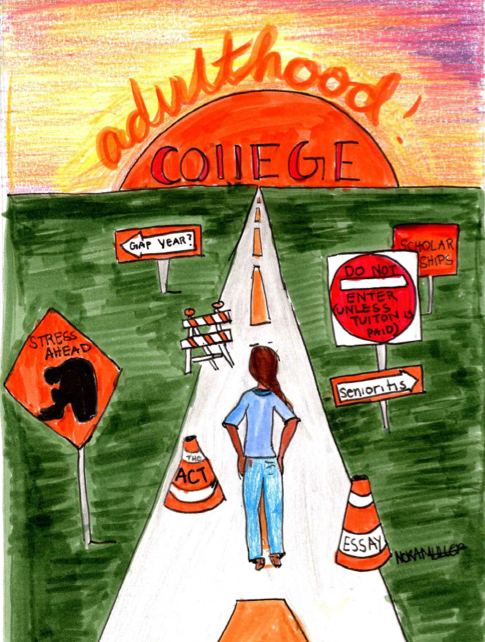Six tips for the six worst months of high school
May 24, 2018
As the class of 2018 prepares to leave high school in the dust, the rest of the school prepares to move one step closer to graduation. For many, this means exploring options for college and trying to make their way through the college process. As a graduating senior, there are a couple of things that are important to remember as you embark on this stressful journey of post-high school planning.
First, and most important, money matters. This cannot be stressed enough. College is very, very expensive, and according to The Institute for College Access and Success, the average amount of student debt upon college graduation is $30,100. The same article also states that 68% of students graduate from college with debt. This is not a number that can, or should, be overlooked. So when you’re looking at colleges, look carefully at how much need-based financial aid they give, and if they give merit aid. For example, a small liberal arts college might seem like the perfect place for you, but if that college gives little to no aid, it’s definitely worth a little more review of your options before deciding on that school.
Secondly, put effort into your standardized test scores, but remember they are not the be all to end all. Seriously, don’t take any standardized test more than three times. Your score probably won’t go up, and by then you’re just wasting your money. Even though test scores are stressed junior year, there are much more important things that colleges consider.
For example, essays, essays, essays. Start early, because they really start to build up after a while. But don’t rush them. Your essays will often be a make or break point for colleges. If you don’t work hard to personalize the essay, colleges will notice. Your essays should be specific to the college, and they should be unique to you. They should show who you are, what your likes and dislikes are, what your personality is and (most importantly) how you will fit into that college.
You will only discover these niches if you research the college. That means actually going on their website, and looking at what academic programs they have that might relate to what you are interested in. Visiting is a great way to get the vibe of the school is. But if the school you are going to is too far, or you can’t visit for another reason, ask your counselor if there is a student from ETHS who is there now that you can contact. The probability is that there is. They will be able to give you great advice with an Evanston perspective.
That brings me to my last point. Most of you will fall in love with a school that won’t pan out; almost all of you will get rejected from at least one school — likely more than that. That is okay. Life is full of rejection; it’s just a fact. If you get a rejection from a school, its ok to be sad. But don’t dwell on it too long. After a day or two, shake it off. You will feel much better, and truly, if you got rejected, it probably wasn’t meant to be. Rejection seems terrifying, but it’s something that will happen. As much as you might not want it to, it will happen.
The college process is hell, but by the end of it you will end up where you are supposed to be. I know people going to their dream school, I know people going to a school that wasn’t on their radar September of their senior year. They are equally happy.




















